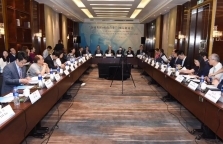On May 31, 2018, the Finance Center for South-South Cooperation (FCSSC), as a supporting organization, participated in the International Seminar on South-South Cooperation in New Era, which was hosted by the Center for International Knowledge on Development (CIKD) and the United Nations Office for South-South Cooperation (UNOSSC). The attendees included relevant experts from developing countries such as China, Nigeria, Bangladesh, Myanmar, and South Africa, and officials from the United Nations. The representative of FCSSC, made opening remarks. He said that the year 2018 had special significance for South-South cooperation and China’s economy because it was the 40th anniversary of the Buenos Aries Plan of Action (BAPA+40), a milestone for South-South cooperation, and Chinese reform and opening up.
“We have achieved remarkable results in South-South cooperation; and in the new era, we should have keen insight into global changes in cooperation,” said the representative of FCSSC. The prominent mark that shows South-South cooperation enters a new era changes in the global landscape. Emerging economies represented by China develop rapidly, which changes the world's economic landscape and expand the content of South-South cooperation. South-South cooperation is more than supplementing South-North cooperation. The second mark is that new opportunities are available for South-South cooperation, including economic and technical development represented by digital technology, the emergence of the digital economy, Internet and big data, blockchain and AI, etc. He added that “To follow the trend of the times, FCSSC is preparing an annual report on South-South cooperation regarding the digital economy, in collaboration with UNOSSC, to discuss how to facilitate South-South cooperation with technology,”.
Many important persons made remarks in the opening ceremony, including Mr. Zhang Laimin, Vice President of the Development Research Center of the State Council (DRC) and Chie Vice President of CIKD, Mr. Zhang Shaogang, Director General of the Department of International Trade and Economic Affairs of the Ministry of Commerce, Huang Yiyang, Counselor of the Department of International Economic Affairs of the Ministry of Foreign Affairs, Mr. Jorge Chediek, Envoy of the UN Secretary-General on South-South Cooperation and Director of UNOSSC, and Mr. Sun Qixin, President of China Agricultural University. Mr. Zhang Laimin believed that South-South cooperation was a fundamental way to narrow the gap between South and North and build a community with a shared future for humanity. Mr. Zhang Shaogang made suggestions for South-South cooperation, including insisting on its positioning, mobilizing resources and promoting partnership building. Mr. Huang said that for South-South cooperation, it was essential to facilitate coordination of corresponding countries’ development strategies and take as new opportunities the Belt and Road Initiative, new industrial revolution and BAPA+40 in May 2019, by focusing on infrastructure and economic and trade cooperation. Mr. Chediek hoped that China would continue to serve as an example for South-South cooperation and especially stated the importance of partnership building in solving practical problems. Mr. Sun explained further the content of South-South cooperation. According to him, China has fed 1/5 of the global population with 1/10 of globally cultivated land within the previous 40 years, marking the fastest poverty reduction in human history. China is supposed to share its experience in that regard with other developing countries to accelerate the building of a community with a shared future for humanity.
Then the participants had in-depth discussions on South-South cooperation progress, roles of South-South and South-North cooperation in realizing the 2030 Agenda for Sustainable Development, Belt and Road and South-South cooperation, and Opportunities and Challenges for South-South cooperation in the new era. The results of this seminar will provide policy suggestions and academic references for the celebration of BAPA+40 to be held in Argentina next March.

